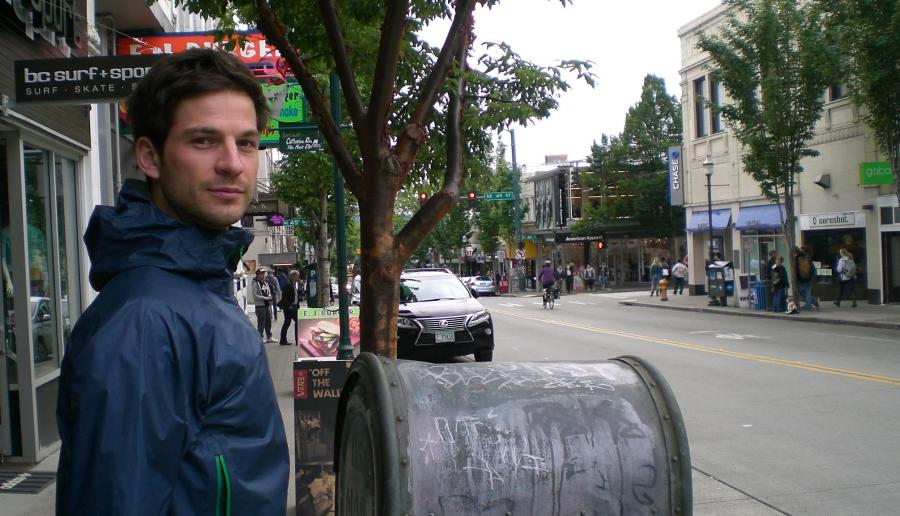

Partnership addresses youth suicide risk and homelessness
Imagine, for a moment, not knowing where you will eat or sleep tonight. Imagine that winning the lottery doesn’t mean millions, but refers to being one of the lucky 45 youth and young adults who will be able to sleep in a church basement on a foam pad. Being unwelcome in most businesses, and subject to arrest for trespassing and loitering for the simple act of using the restroom. Imagine having the ingenuity and guts to navigate these and other challenges every day because it’s better than going back to a family that’s abusive, unaccepting, unable or non-existent.
That’s the reality Forefront Operations Manager Stephen Miller, MSW, witnesses daily near his office one block off “the Ave,” a gathering place for young people experiencing homelessness in Seattle’s University District. He doesn’t have to use his imagination because he’s also seen the experience up close, both in his own family and as a volunteer working with youth. He speaks with respect and passion about the complex histories, tough choices and persistent traumas that put this population at high risk for suicide.
Suicide is the second leading cause of death for young people from 10-24 years of age. For those with unstable housing or none at all, major suicide risk factors— including prolonged stress, maltreatment and mental disorders—are frighteningly parallel to their life circumstances. While many of these youth are amazingly resilient and creative despite their circumstances, many protective factors such as effective mental health care and positive connections to family and social institutions are limited or, at best, weak. “There’s definitely an imbalance,” Miller says.
In King County alone, more than 800 youths and young adults are homeless or unstably housed on any given night, reports the Committee to End Homelessness. Of these, at least 20% identify as LGBTIQ, at least 50% are people of color and at least a third have experience with the foster care system. According to the Trevor Project and the Suicide Prevention Resource Center all of these factors combine to make homeless youth more at risk for suicide than many other groups.
Community connections can become protective factors, but rarely through such conventional avenues as school, work or medical care. “There’s a thirst for trust, but past experience—with family, courts, schools, police, hospitals and other systems—makes it hard. From the perspective of a young person who has often been let down, it often makes sense not to trust the system” Miller explains. In contrast, he says, “youth service providers and volunteers work incredibly hard to make connections, listen, support, be consistent, and safe to trust.”
As trust builds, the conversation may open up and hint about depression, despair, or a wish to die. Then what? Miller remembers such a moment as a shelter volunteer: “I had no training or background in suicide prevention. I could only listen.” Listening and caring goes a long way, but he would like to have known how to ask questions, explain why he was concerned and try to get that young person to the available help.
He would have liked some basic training, in suicide prevention—something like the safeTALK class he and Forefront Master Trainer Sue Eastgard taught last month. It was the first of 10 trainings the Mark Torrance Foundation and Forefront are offering at no cost to staff, service providers and volunteers who work with youth experiencing homelessness or foster care in King County.
The “safe” part of the title stands for Suicide Alertness for Everyone. The three-hour sessions provide basic education about suicide risk, warning signs, appropriate responses, the TALK steps (Tell, Ask, Listen and KeepSafe) and making the connection to individuals who are available, approachable and able to provide further help. The course often is compared to CPR in the sense that it provides basic knowledge and practice for keeping someone alive through a crisis until professional help can be engaged.
More than a dozen organizations* were represented at the initial training. Participants included case managers, administrators, life skills coordinators, peer outreach interns, LGBTIQ project liaisons, and network coordinators. Feedback was positive, with participants making evaluation comments such as: “This is a great reminder to take invitations seriously and engage people around a taboo [subject] that sometimes feels like it would be easier to avoid,” and “I appreciated how candid the trainers were and knowledgeable.”
Miller wishes he could change the underlying issues that create the unacceptable reality of homelessness and instability in a society that could and should do better. While he knows these trainings cannot solve all of these problems, he is grateful that the Torrance Foundation is helping Forefront “give one more tool to service providers on the ground who are working to save the lives of youth.”
No-cost workshops are scheduled through Oct. 22. Click here for more information and registration.
* Thank you to these organizations at the inaugural training: AGE UP, All Girl Everything Ultimate Program, Catholic Community Services, Cocoon House, Hepatitis Education Project, Lambert House, NeighborCare Health, Neighborhood House, New Horizons, ROOTS Young Adult Shelter, Seattle Public Schools, Teen Feed, The Mockingbird Society, YMCA Young Adult Services, YouthCare.